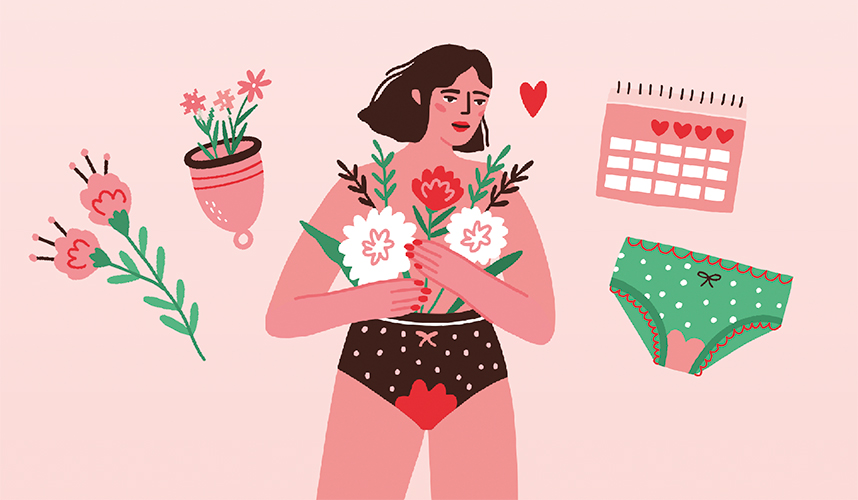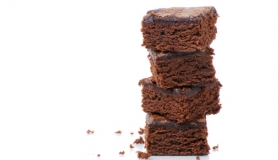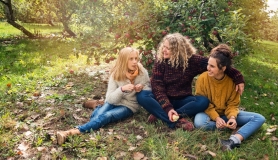What inspired you to write My Period?
“Three or four years ago I met Jane Hardwicke Collings, at a birth conference in Australia. She runs The School of Shamanic Womancraft, and describes herself as an agent of the goddess, but is very down-to-earth and practical. She talks about how when women are pregnant, they’ve already absorbed so much negativity about their bodies, that a lot of ante-natal work involves unlearning and squeezing the spot of some of these negative cultural messages. I started thinking about how a lot of this negative messaging begins around menstruation, and about how important it is to get more positive messages to young girls about their bodies, how amazing they are and how well they function.”
How do you expect parents and children to use your book?
“I’ve written two books about birth and one about periods and have had home births, but there are some things I find difficult to talk about because I’m a human and a product of my upbringing. Masturbation gets a mention in the book, and that’s still a big taboo for a lot of women. Books are helpful because they open up the conversation. Also, sometimes I feel really anxious that I’m going to give my children accurate information, so end up saying things like, “Hang on, I’m just going to google: How are twins made?’.
We love the self-esteem exercises dotted throughout the book…
“The whole book is about positive messages about your body, loving your body, listening and tuning in to your body. I used to be a drama therapist and have done lots of these exercises with kids, and am familiar with how impactful they can be on people. Puberty is a difficult time, when you suddenly come into a very different type of self-awareness and how other people see you. The child might not even do the exercises, but just reading about them, they’re in their mind. There’s a subtle message of doing something to make them feel more positive about themselves, even if they don’t come back to it for another few years.”
“I remember finding out that my friend could feel when she ovulated. It had never occurred to me that was possible”
What age is the book aimed at?
“Pre-teen; nine to around 12 or 13. I’ve even had lots of mums telling me they’ve learned stuff from reading the book. You can see from your child how close to puberty they are. Although there is still a real vacuum of information around women’s bodies and how they work; about 50 per cent of women don’t know where their cervix is or what it’s for, many call their vulva their vagina or use a euphemism. The clitoris often doesn’t get a look-in, so I was determined that was going to go in the book!”
You mention pretty much every form of period product, including those that are eco-friendly…
“I wanted to make sure children had all the information. The whole environmental aspect is really important to young people now; to all of us. The biggest breakthrough has been period pants. You can wear them all day; go to school with your pair of pants on and you don’t have to think about it. How amazing is that? And they’re so much better for the environment. I also found out about period swimwear just in time for it to get in the book.”
You’ve included a section on cycle charting, which feels like a subject usually reserved for adults…
“I didn’t learn about my whole cycle at school. A lot of period education is focused on ‘What is a period? This is a tampon, this is a pad, it’s a bit of a pain in the neck, suck it up.’ It took me a long time to work out that it’s just part of a cycle. I remember finding out that my friend could feel when she ovulated. It had never occurred to me that was possible. If you get to the point when you want to have children, then it’s absolutely golden to have information like that.
But even if you never want to have children, and even as a child, it’s really helpful to understand that you have a journey through a month. It can affect your energy levels, might have an impact on your emotional or mental health, your self-esteem, the things you feel like eating, how well you can study or how far you can run. Some people feel a shift in energy around ovulation; they feel more energised or creative.
Anything that helps anybody tune in more to themselves and how they’re feeling can only be a good thing.”
RESOURCES
READ My Period: Find Your Flow and Feel Proud of Your Period by Milli Hill is out now, published by Wren & Rook.
DISCOVER Find more Milli here millihill.co.uk




_278_160_c1.jpg)


